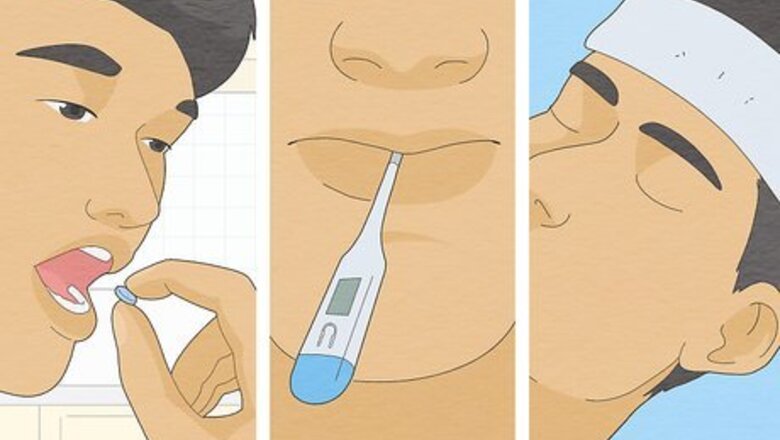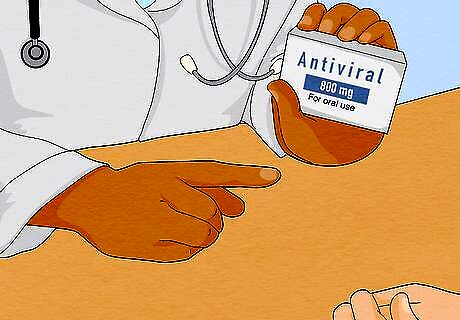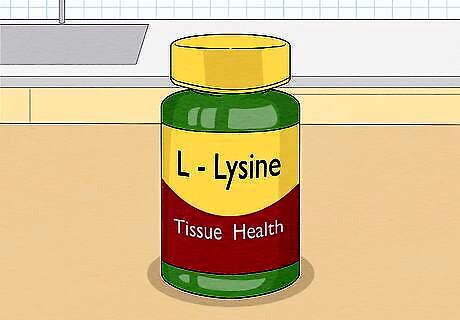
views
X
Trustworthy Source
World Health Organization
Health information and news provided by the World Health Organization
Go to source
If you have herpes (usually type 1), you probably know that the virus causes cold sores. Most of the time, these appear on the lips, but they can also appear on the chin, cheeks, and nostrils. These outbreaks often recur and are very contagious. Luckily, there are several ways that you can alleviate symptoms and even reduce the likelihood of future outbreaks.
Here are 11 effective ways to treat cold sores and fever blisters.
Use medication to reduce the pain and treat your fever.

Over-the-counter painkillers can lessen your symptoms. Cold sores can really hurt sometimes, so try taking aspirin acetaminophen (Tylenol), or ibuprofen (Advil) to reduce the pain and inflammation. Cold sores are also sometimes accompanied by a fever. Thankfully, acetaminophen can double as a fever-reducer. Follow the instructions on the label and take the medication as directed (choose one and don't combine the medication unless you are instructed to do so by your doctor). Check your temperature regularly to monitor your fever. Talk to your doctor if it persists for more than a few days or if your temperature continues to rise. Additional methods you can take to fight your fever include lukewarm baths, cold compresses on the inner thighs, feet, arms, and neck, warm tea, popsicles, and lots of sleep. Children should not take aspirin due to the risk of developing Reye’s syndrome.
Use topical antiviral cream.

Cold sore ointment like docosanol (Abreva) provides direct pain relief. It can also ease symptoms so that your outbreak doesn't last as long. To safely apply the medication, wash your hands or wear gloves. Gently dab the medication onto the cold sore. After, wash your hands to make sure you don't spread the infection. You can apply the treatment up to 6 times a day. Wait 3 hours between each application, and repeat the treatment for 7 days. Creams containing lidocaine, acyclovir, and benzocaine can provide additional pain relief.
Talk to your doctor about taking an oral antiviral.

These medications include Penciclovir, Acyclovir, and Famciclovir. Though they can't cure the virus, they can speed up the healing process! They'll also reduce the severity of a cold sore outbreak. When taking the medication, follow the instructions on the label and start treatment as soon as you notice signs of a cold sore outbreak! If you have frequent outbreaks, your doctor may advise that you take the medication daily. This will hopefully suppress future outbreaks. If you have a compromised immune system or an outbreak that lasts longer than 2 weeks, your doctor may prescribe additional medication. Some outbreaks can be pretty serious and need additional medical care to be treated. Herpes infections in the eyes can be severe. If your infection spreads to your eyes, see your doctor immediately to get the care you need. People with already weakened immune systems are at particular risk of long-term complications from a herpes outbreak. These complications include herpes meningoencephalitis, a condition in which the herpes virus spreads to the brain.
Avoid kissing and sharing utensils during an outbreak.

The herpes simplex virus is very contagious. Avoid kissing or other mouth-to-body activities during your outbreak. You should also steer clear of sharing utensils, cups, or straws with other people, and wash dishes and utensils thoroughly to disinfect them. Wash your hands frequently and don’t touch the sore to prevent spread. Don’t touch your eyes or genitals after touching the sore. This could spread the virus to other parts of your body.
Make lifestyle changes to prevent future outbreaks.

Wear sunscreen and keep your immune system healthy. Taking precautionary measures like this in your day-to-day life can reduce your symptoms and lessen how many outbreaks you have. Always wear zinc oxide sunscreen on your lips and near your mouth, as sun exposure can trigger outbreaks. To maintain a healthy immune system, eat a healthy diet, get plenty of rest, and exercise regularly. You should also make sure you practice safe oral sex to avoid spreading the virus to your genitals. Use a dental dam or condom to be safe. Wash towels and linens after each use to avoid spreading the infection.
Apply a cold compress to the sore.

Ice reduces pain and inflammation. Apply an ice pack, a cold compress, or a cold rag to the cold sore for 10-15 minutes at a time. Do this several times a day to ease discomfort. Make sure you have a barrier between the ice and your skin, like a cloth or even a paper towel. That way the ice won't be so harsh on your cold sore. If you use a rag, remember to wash it as soon as you're done. Use a new, clean rag each time you ice the cold sore.
Keep your mouth and lips moisturized.

Use lip balm or moisturizer to prevent your cold sore from drying out. As your cold sore starts to heal, it can sometimes crack, peel, and bleed. This can be pretty painful! Apply petroleum jelly (Vaseline or Aquaphor) to your lips and mouth to moisturize the area. Make sure to wash your hands before applying as well as after to prevent spreading the infection. This will help ease the pain and hopefully prevent any bleeding. Lip balm can also work to moisturize your cold sore. Do not share lip balm if you have herpes simplex.
Apply rhubarb and sage cream.

Rhubarb and sage cream is just as effective as some OTC topical treatments. A study published by the National Library of Medicine found that rhubarb and sage cream works just as well to minimize and shorten cold sore outbreaks as acyclovir (Zovirax) cream. The cream doesn't require a prescription and can be purchased online. You can also try finding the cream at your local health food store!
Try out propolis (synthetic beeswax).

Use 3% propolis ointment to reduce symptoms and shorten outbreaks. Made from the buds of poplar trees, propolis is a substance commonly found in beehives. For best results, apply the ointment to cold sores 5 times daily.
Utilize lysine supplements or cream.

Lysine is an amino acid that can reduce the duration of your outbreak. Though more evidence is needed, some studies show that lysine interferes with the absorption of the amino acid arginine in the intestine. The herpes virus needs arginine to replicate, which makes lysine an effective means to reduce outbreaks. Take lysine as a supplement or apply it as a cream directly to the cold sore. Both are available at drugstores without a prescription. Only take lysine supplements when you're experiencing an outbreak. Long-term use can cause side effects like kidney problems. Follow the dosage instructions on the bottle. Taking too much can result in diarrhea and stomach pains.
Reduce your stress level.

Stress can trigger a cold sore outbreak. Lowering your stress level can shorten the amount of time your outbreak lasts and reduce the likelihood of future outbreaks (though there is no way to completely prevent an outbreak). To reduce stress, try meditation, yoga, and breathing exercises. You should also make sure to eat a healthy diet and get at least 7 hours of sleep each night to reduce stress. Talk to a therapist or counselor if stress gets in the way of your day-to-day life.

















Comments
0 comment